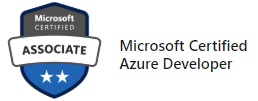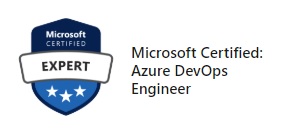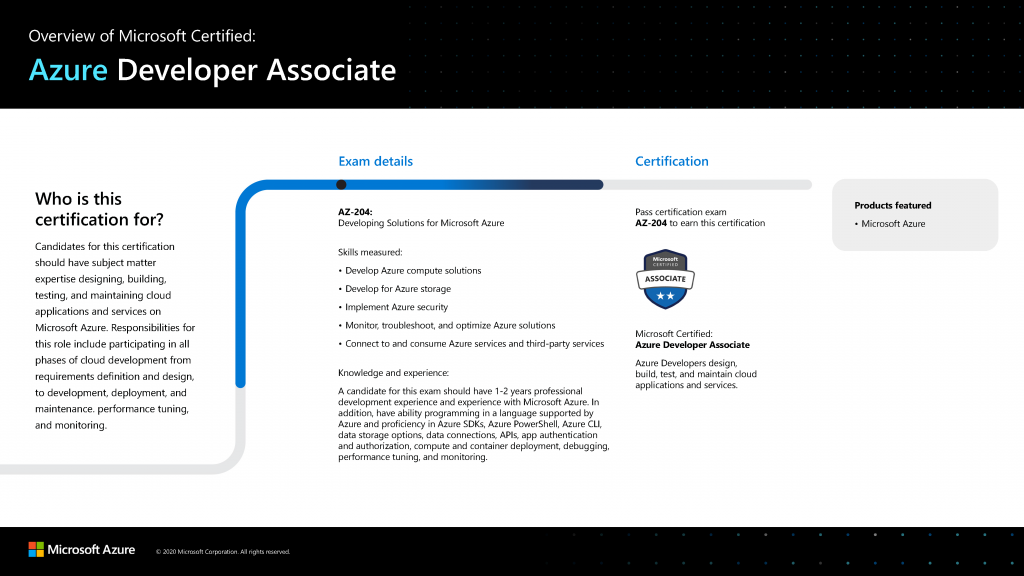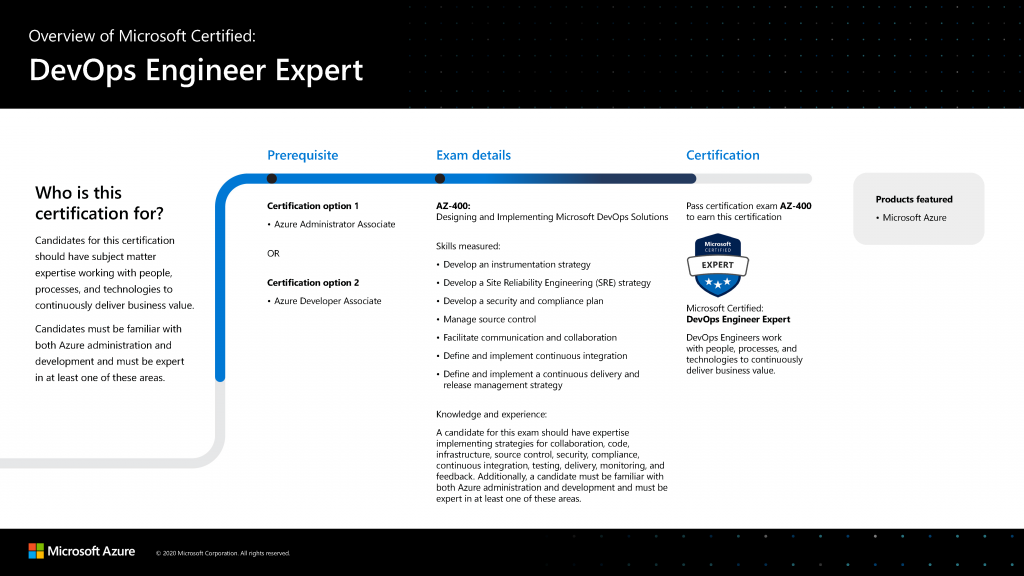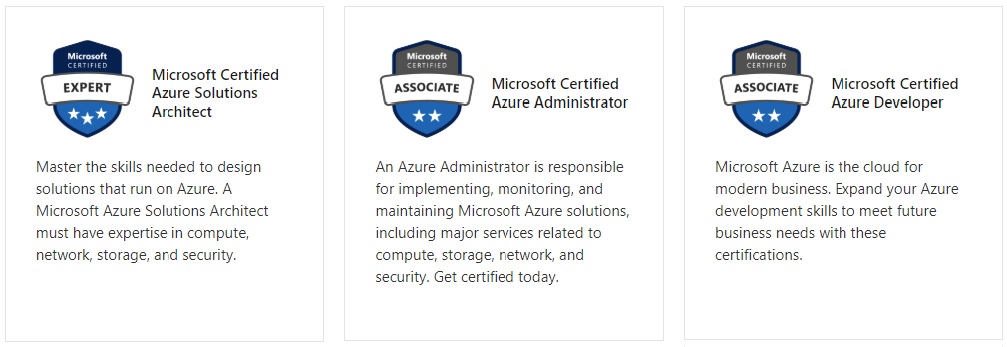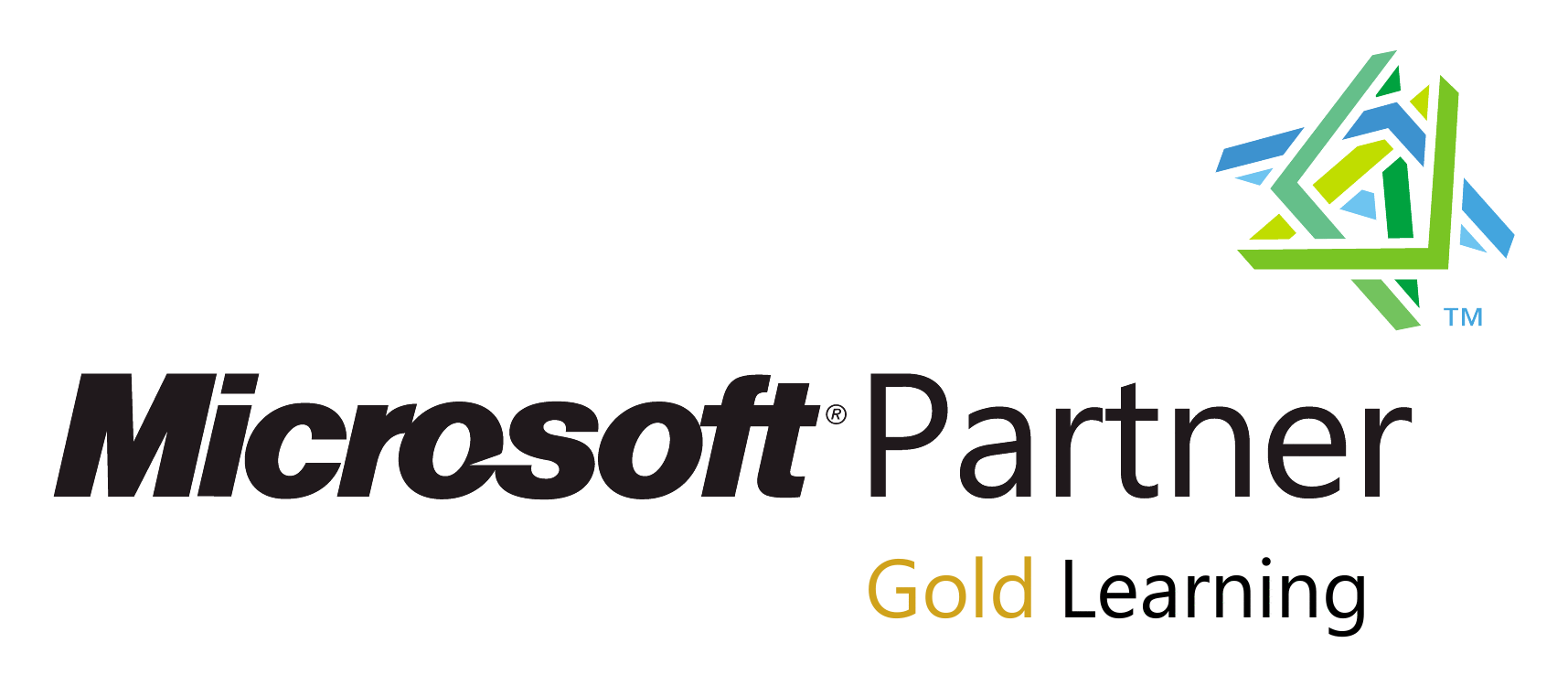MCA Microsoft Azure Developer w/ MCE Azure DevOps COMBO Training & Certification Boot Camp – 10 Days
Training Schedule and Pricing
Our training model blends knowledge and certification prep into one solution. Interact face-to-face with vendor certified trainers AT OUR TRAINING CENTER IN SARASOTA, FL - OR - attend the same instructor-led live camp ONLINE.
-
May062024Delivery Format:CLASSROOM LIVEDate:05.06.2024 - 05.17.2024Location:SARASOTAPrice Includes:Instructor Led Class, Official Courseware, Labs and Exams$5,99510 days
-
Jun032024Delivery Format:CLASSROOM LIVEDate:06.03.2024 - 06.14.2024Location:SARASOTAPrice Includes:Instructor Led Class, Official Courseware, Labs and Exams$5,99510 days
-
Jul082024Delivery Format:CLASSROOM LIVEDate:07.08.2024 - 07.19.2024Location:SARASOTAPrice Includes:Instructor Led Class, Official Courseware, Labs and Exams$5,99510 days
What's Included
2 Microsoft Test Voucher
2 Microsoft Official Courses
1 Retake Voucher (per exam, if needed)
Microsoft Study Labs & Simulations
Onsite Pearson Vue Test Center
Instructor Led Classroom Training
Certification Camps combines the Azure Developer Role Based Certifications - MCA Azure Developer & MCE Azure DevOps Engineer Expert into a custom 10 day Microsoft Official Boot Camp (No camp on Sunday). This camp focuses on actual job task for designing and building cloud solutions for applications and services. Students will learn how to develop apps and services by using Azure tools and technologies, including storage, security, compute, and communications. Students learn how to build apps end to end participating in all phases of development, from solution design, to development and deployment, to testing and maintenance.
Microsoft Azure Developers design, build, test, and maintain cloud solutions, such as applications and services, partnering with cloud solution architects, cloud DBAs, cloud administrators, and clients to implement these solutions. Azure DevOps professionals combine people, process, and technologies to continuously deliver valuable products and services that meet end user needs and business objectives. This camp covers topics related to these job roles.
The Microsoft Certified Azure Developer Associate boot camp is taught using Microsoft Official Courseware
AZ-204T00:Developing solutions for Microsoft Azure
AZ-400T00: Designing and Implementing Microsoft DevOps Solutions
While attending this 10 day camp - students will take two exams (AZ-204 & AZ-400) to achieve the Microsoft Certified Associate Azure Developer & Microsoft Certified Expert Azure DevOps certifications. This hands on, instructor led live camp teaches the knowledge to develop / deploy applications in an Azure environment along with the knowledge needed for the certification exams (administered while attending camp).
Skills Gained:
How to implement Azure compute solutions
Create Azure Functions
Implement and manage web apps
Develop solutions utilizing Azure storage
Implement authentication and authorization
Secure solutions by using KeyVault and Managed Identities
How to connect to and consume Azure Services and third-party services
Monitoring, Troubleshooting and optimizing Azure Solutions
Plan for the transformation with shared goals and timelines
Select a project and identify project metrics and KPIs
Create a team and agile organization structure
Describe the benefits of using Source Control
Migrate from TFVC to Git
Scale Git for Enterprise DevOps
Recommend artifact management tools and practices
Abstract common packages to enable sharing and reuse
Migrate and consolidate artifacts
Migrate and integrate source control measures
Manage application config and secrets
Develop a project quality strategy
Plan for secure development practices and compliance rules
Implement and manage build infrastructure
Explain why continuous integration matters
Implement continuous integration using Azure DevOps
Manage code quality including: technical debt, SonarCloud, and other tooling solutions
Manage security policies with open source, OWASP, and WhiteSource Bolt
Implement a container strategy including how containers are different from virtual machines and how microservices use containers
Implement containers using Docker
Inspect open source software packages for security and license compliance to align with corporate standards
Configure build pipeline to access package security and license rating
Configure secure access to package feeds
Inspect codebase to identify code dependencies that can be converted to packages
Identify and recommend standardized package types and versions across the solution
Refactor existing build pipelines to implement version strategy that publishes packages
Manage security and compliance
Differentiate between a release and a deployment
Define the components of a release pipeline
Explain things to consider when designing your release strategy
Classify a release versus a release process and outline how to control the quality of both
Describe the principle of release gates and how to deal with release notes and documentation
Explain deployment patterns, both in the traditional sense and in the modern sense
Choose a release management tool
Explain the terminology used in Azure DevOps and other Release Management Tooling
Describe what a Build and Release task is, what it can do, and some available deployment tasks
Classify an Agent, Agent Queue, and Agent Pool
Explain why you sometimes need multiple release jobs in one release pipeline
Differentiate between multi-agent and multi-configuration release job
Use release variables and stage variables in your release pipeline
Deploy to an environment securely using a service connection
Embed testing in the pipeline
List the different ways to inspect the health of your pipeline and release by using alerts, service hooks, and reports
Create a release gate
Describe deployment patterns
Implement Blue Green Deployment
Implement Canary Release
Implement Progressive Exposure Deployment
Configure crash report integration for client applications
Develop monitoring and status dashboards
Implement routing for client application crash report data
Implement tools to track system usage, feature usage, and flow
Integrate and configure ticketing systems with development team's work management
Implement a mobile DevOps strategy
Apply infrastructure and configuration as code principles.
Deploy and manage infrastructure using Microsoft automation technologies such as ARM templates, PowerShell, and Azure CLI
Describe deployment models and services that are available with Azure
Deploy and configure a Managed Kubernetes cluster
Deploy and configure infrastructure using 3rd party tools and services with Azure, such as Chef, Puppet, Ansible, SaltStack, and Terraform
Define an infrastructure and configuration strategy and appropriate toolset for a release pipeline and application infrastructure
Implement compliance and security in your application infrastructure
Design practices to measure end-user satisfaction
Design processes to capture and analyze user feedback from external sources
Design routing for client application crash report data
Recommend monitoring tools and technologies
Recommend system and feature usage tracking tools
Analyze alerts to establish a baseline
Analyze telemetry to establish a baseline
Perform live site reviews and capture feedback for system outages
Perform ongoing tuning to reduce meaningless or non-actionable alerts
Topics Covered in this Official Boot Camp
Creating Azure App Service Web Apps
Students will learn how to build a web application on the Azure App Service platform. They will learn how the platform functions and how to create, configure, scale, secure, and deploy to the App Service platform.
Lessons
- Azure App Service core concepts
- Creating an Azure App Service Web App
- Configuring and Monitoring App Service apps
- Scaling App Service apps
- Azure App Service staging environments
Implement Azure functions
This module covers creating Functions apps, and how to integrate triggers and inputs/outputs in to the app.
Lessons
- Azure Functions overview
- Developing Azure Functions
- Implement Durable Functions
Develop solutions that use blob storage
Students will learn how Azure Blob storage works, how to manage data through the hot/cold/archive blob storage lifecycle, and how to use the Azure Blob storage client library to manage data and metadata.
Lessons
- Azure Blob storage core concepts
- Managing the Azure Blob storage lifecycle
- Working with Azure Blob storage
Develop solutions that use Cosmos DB storage
Students will learn how Cosmos DB is structured and how data consistency is managed. Students will also learn how to create Cosmos DB accounts and create databases, containers, and items by using a mix of the Azure Portal and the .NET SDK.
Lessons
- Azure Cosmos DB overview
- Azure Cosmos DB data structure
- Working with Azure Cosmos DB resources and data
Implement IaaS solutions
This module instructs students on how to use create VMs and container images to use in their solutions. It covers creating VMs, using ARM templates to automate resource deployment, create and manage Docker images, publishing an image to the Azure Container Registry, and running a container in Azure Container Instances.
Lessons
- Provisioning VMs in Azure
- Create and deploy ARM templates
- Create container images for solutions
- Publish a container image to Azure Container Registry
- Create and run container images in Azure Container Instances
Implement user authentication and authorization
Students will learn how to leverage the Microsoft Identity Platform v2.0 to manage authentication and access to resources. Students will also learn how to use the Microsoft Authentication Library and Microsoft Graph to authenticate a user and retrieve information stored in Azure, and how and when to use Shared Access Signatures.
Lessons
- Microsoft Identity Platform v2.0
- Authentication using the Microsoft Authentication Library
- Using Microsoft Graph
- Authorizing data operations in Azure Storage
Implement secure cloud solutions
This module covers how to secure the information (keys, secrets, certificates) an application uses to access resources. It also covers securing application configuration information.
Lessons
- Manage keys, secrets, and certificates by using the KeyVault API
- Implement Managed Identities for Azure resources
- Secure app configuration data by using Azure App Configuration
Implement API Management
Students will learn how to publish APIs, create policies to manage information shared through the API, and to manage access to their APIs by using the Azure API Management service.
Lessons
- API Management overview
- Defining policies for APIs
- Securing your APIs
Develop App Service Logic Apps
This module teaches students how to use Azure Logic Apps to schedule, automate, and orchestrate tasks, business processes, workflows, and services across enterprises or organizations.
Lessons
- Azure Logic Apps overview
- Creating custom connectors for Logic Apps
Develop event-based solutions
Students will learn how to build applications with event-based architectures.
Lessons
- Implement solutions that use Azure Event Grid
- Implement solutions that use Azure Event Hubs
- Implement solutions that use Azure Notification Hubs
Develop message-based solutions
Students will learn how to build applications with message-based architectures.
Lessons
- Implement solutions that use Azure Service Bus
- Implement solutions that use Azure Queue Storage queues
Monitor and optimize Azure solutions
This module teaches students how to instrument their code for telemetry and how to analyze and troubleshoot their apps.
Lessons
- Overview of monitoring in Azure
- Instrument an app for monitoring
- Analyzing and troubleshooting apps
- Implement code that handles transient faults
Integrate caching and content delivery within solutions
Students will learn how to use different caching services to improve the performance of their apps.
Lessons
- Develop for Azure Cache for Redis
- Develop for storage on CDNs
Planning for DevOps
Lessons
- Transformation Planning
- Project Selection
- Team Structures
- Migrating to Azure DevOps
Lab : Agile Planning and Portfolio Management with Azure Boards
After completing this module, students will be able to:
- Plan for the transformation with shared goals and timelines
- Select a project and identify project metrics and KPIs
- Create a team and agile organizational structure
- Design a tool integration strategy
- Design a license management strategy (e.g. VSTS users)
- Design a strategy for end-to-end traceability from work items to working software
- Design an authentication and access strategy
- Design a strategy for integrating on-premises and cloud resources
Getting started with Source Control
Lessons
- What is Source Control
- Benefits of Source Control
- Types of Source Control Systems
- Introduction to Azure Repos
- Introduction to GitHub
- Migrating from Team Foundation Version Control (TFVC) to Git in Azure Repos
- Authenticating to Git in Azure Repos
Lab : Version Controlling with Git
After completing this module, students will be able to:
- Describe the benefits of using Source Control
- Describe Azure Repos and GitHub
- Migrate from TFVC to Git
Scaling Git for enterprise DevOps
Lessons
- How to Structure your Git Repo
- Git Branching Workflows
- Collaborating with Pull Requests in Azure Repos
- Why care about GitHooks
- Fostering Inner Source
Lab : Code Review with Pull Requests
After completing this module, students will be able to:
- Explain how to structure Git repos
- Describe Git branching workflows
- Leverage pull requests for collaboration and code reviews
- Leverage Git hooks for automation
- Use git to foster inner source across the organization
Consolidating Artifacts & Designing a Dependency Management Strategy
Lessons
- Packaging Dependencies
- Package Management
- Migrating and Consolidating Artifacts
Lab : Updating Packages
After completing this module, students will be able to:
- Recommend artifact management tools and practices
- Abstract common packages to enable sharing and reuse
- Migrate and consolidate artifacts
- Migrate and integrate source control measures
Implementing Continuous Integration with Azure Pipelines
Lessons
- The concept of pipelines in DevOps
- Azure Pipelines
- Evaluate use of Hosted vs Private Agents
- Agent Pools
- Pipelines and Concurrency
- Azure DevOps and Open Source Projects (Public Projects)
- Azure Pipelines YAML vs Visual Designer
- Continuous Integration Overview
- Implementing a Build Strategy
- Integration with Azure Pipelines
- Integrate External Source Control with Azure Pipelines
- Set Up Private Agents
- Analyze and Integrate Docker Multi-Stage Builds
Lab : Enabling Continuous Integration with Azure Pipelines
Lab : Integrating External Source Control with Azure Pipelines
After completing this module, students will be able to:
- Implement and manage build infrastructure
- Explain why continuous integration matters
- Implement continuous integration using Azure DevOps
Managing Application Config and Secrets
Lessons
- Introduction to Security
- Implement secure and compliant development process
- Rethinking application config data
- Manage secrets, tokens, and certificates
- Implement tools for managing security and compliance in a pipeline
Lab : Integrating Azure Key Vault with Azure DevOps
After completing this module, students will be able to:
- Manage application config and secrets
- Implement tools for managing security and compliance in pipeline
Managing Code Quality and Security Policies
Lessons
- Managing Code Quality
- Managing Security Policies
Lab : Managing Technical Debt with Azure DevOps and SonarCloud
After completing this module, students will be able to:
- Manage code quality including: technical debt SonarCloud, and other tooling solutions
- Manage security policies with open source and OWASP
Implementing a Container Build Strategy
Lessons
- Implementing a Container Build Strategy
Lab : Modernizing Existing ASP.NET Apps with Azure
After completing this module, students will be able to:
- Implement a container strategy including how containers are different from virtual machines and how microservices use containers
- Implement containers using Docker
Manage Artifact versioning, security & compliance
Lessons
- Package security
- Open source software
- Integrating license and vulnerability scans
- Implement a versioning strategy
Lab : Manage Open Source Security and License with WhiteSource
After completing this module, students will be able to:
- Inspect open source software packages for security and license compliance to align with corporate standards
- Configure build pipeline to access package security and license rating
- Configure secure access to package feeds
- Inspect codebase to identify code dependencies that can be converted to packages
- Identify and recommend standardized package types and versions across the solution
- Refactor existing build pipelines to implement version strategy that publishes packages
- Manage security and compliance
Design a Release Strategy
Lessons
- Introduction to Continuous Delivery
- Release strategy recommendations
- Building a High-Quality Release pipeline
- Choosing a deployment pattern
- Choosing the right release management tool
After completing this module, students will be able to:
- Differentiate between a release and a deployment
- Define the components of a release pipeline
- Explain things to consider when designing your release strategy
- Classify a release versus a release process and outline how to control the quality of both
- Describe the principle of release gates and how to deal with release notes and documentation
- Explain deployment patterns, both in the traditional sense and in the modern sense
- Choose a release management tool
Set up a Release Management Workflow
Lessons
- Create a Release Pipeline
- Provision and Configure Environments
- Manage and Modularize Tasks and Templates
- Integrate Secrets with the release pipeline
- Configure Automated Integration and Functional Test Automation
- Automate Inspection of Health
Lab : Configuring Pipelines as Code with YAML
Lab : Setting up secrets in the pipeline with Azure Key vault
Lab : Setting up and Running Functional Tests
Lab : Using Azure Monitor as release gate
Lab : Creating a release Dashboard
After completing this module, students will be able to:
- Explain the terminology used in Azure DevOps and other Release Management Tooling
- Describe what a Build and Release task is, what it can do, and some available deployment tasks
- Classify an Agent, Agent Queue, and Agent Pool
- Explain why you sometimes need multiple release jobs in one release pipeline
- Differentiate between multi-agent and multi-configuration release job
- Use release variables and stage variables in your release pipeline
- Deploy to an environment securely using a service connection
- Embed testing in the pipeline
- List the different ways to inspect the health of your pipeline and release by using alerts, service hooks, and reports
- Create a release gate
Implement an appropriate deployment pattern
Lessons
- Introduction to Deployment Patterns
- Implement Blue Green Deployment
- Feature Toggles
- Canary Releases
- Dark Launching
- AB Testing
- Progressive Exposure Deployment
Lab : Feature Flag Management with LaunchDarkly and Azure DevOps
After completing this module, students will be able to:
- Describe deployment patterns
- Implement Blue Green Deployment
- Implement Canary Release
- Implement Progressive Exposure Deployment
Implement process for routing system feedback to development teams
Lessons
- Implement Tools to Track System Usage, Feature Usage, and Flow
- Implement Routing for Mobile Application Crash Report Data
- Develop Monitoring and Status Dashboards
- Integrate and Configure Ticketing Systems
Lab : Monitoring Application Performance
After completing this module, students will be able to:
- Configure crash report integration for client applications
- Develop monitoring and status dashboards
- Implement routing for client application crash report data
- Implement tools to track system usage, feature usage, and flow
- Integrate and configure ticketing systems with development team’s work management
Infrastructure and Configuration Azure Tools
Lessons
- Infrastructure as Code and Configuration Management
- Create Azure Resources using ARM Templates
- Create Azure Resources using Azure CLI
- Create Azure Resources by using Azure PowerShell
- Desired State Configuration (DSC)
- Azure Automation with DevOps
- Additional Automation Tools
Lab : Azure Deployments using Resource Manager Templates
After completing this module, students will be able to:
- Apply infrastructure and configuration as code principles
- Deploy and manage infrastructure using Microsoft automation technologies such as ARM templates, PowerShell, and Azure CLI
Azure Deployment Models and Services
Lessons
- Deployment Modules and Options
- Azure Infrastructure-as-a-Service (IaaS) Services
- Azure Platform-as-a-Service (PaaS) services
- Serverless and HPC Computer Services
- Azure Service Fabric
Lab : Deploying a Dockerized Java app to Azure Web App for Containers
After completing this module, students will be able to:
- Describe deployment models and services that are available with Azure
Create and Manage Kubernetes Service Infrastructure
Lessons
- Azure Kubernetes Service
Lab : Deploying a multi-container application to Azure Kubernetes Service
After completing this module, students will be able to:
- Deploy and configure a Managed Kubernetes cluster
Third Party Infrastructure as Code Tools available with Azure
Lessons
- Chef
- Puppet
- Ansible
- Terraform
Lab : Infrastructure as Code
Lab : Automating Your Infrastructure Deployments in the Cloud with Terraform and Azure Pipelines
After completing this module, students will be able to:
- Deploy and configure infrastructure using 3rd party tools and services with Azure, such as Chef, Puppet, Ansible, and Terraform
Implement Compliance and Security in your Infrastructure
Lessons
- Security and Compliance Principles with DevOps
- Azure security Center
Lab : Implement Security and Compliance in an Azure DevOps Pipeline
After completing this module, students will be able to:
- Define an infrastructure and configuration strategy and appropriate toolset for a release pipeline and application infrastructure
- Implement compliance and security in your application infrastructure
Recommend and design system feedback mechanisms
Lessons
- The inner loop
- Continuous Experimentation mindset
- Design practices to measure end-user satisfaction
- Design processes to capture and analyze user feedback
- Design process to automate application analytics
Lab : Integration between Azure DevOps and Teams
After completing this module, students will be able to:
- Design practices to measure end-user satisfaction
- Design processes to capture and analyze user feedback from external sources
- Design routing for client application crash report data
- Recommend monitoring tools and technologies
- Recommend system and feature usage tracking tools
Optimize feedback mechanisms
Lessons
- Site Reliability Engineering
- Analyze telemetry to establish a baseline
- Perform ongoing tuning to reduce meaningless or non-actionable alerts
- Analyze alerts to establish a baseline
- Blameless Retrospectives and a Just Culture
After completing this module, students will be able to:
- Analyze alerts to establish a baseline
- Analyze telemetry to establish a baseline
- Perform live site reviews and capture feedback for system outages
- Perform ongoing tuning to reduce meaningless or non-actionable alerts
Microsoft offers these additional Azure certifications
Microsoft Job Role-based Azure Certifications
Microsoft has aligned Azure certifications and training to job roles - focusing on Admin, Dev or Architect.
Each certification requires 2 exams and no certification has any prerequisite certification requirements.
Certification Camps has developed a comprehensive training / delivery format which focuses on learning beyond the core content accessible to any Microsoft training provider. Our program incorporates interactive demonstrations with explanations which go beyond the content of the book. Additional content, videos, labs & demonstrations are provided to expand on advanced topics - providing additional insight and perspective. Certification Camps training is not the typical book & PowerPoint presentation found at any local training center.
As a Microsoft Certified Partner with Gold Learning Competency - we adhere to the strict guidelines, standards and requirements to use Microsoft's exclusive curriculum. More over - our standards go beyond the "minimum requirements" set forth by Microsoft Learning.
We leverage our partnership benefits of courseware customization to build end to end technology training solutions. Students gain practical skills which can be implemented immediately.
At most training centers - learning starts on the first day of class and ends on the last day. Our boot camp training program is designed to offer resources before, during and after.
CERTIFICATION CAMPS FACILITIES
CAMPUS - Certification Camps built out a stand alone training center (not a hotel conference room) with spacious classrooms, new desk, Herman Miller Aeron chairs & comfortable common areas. Each student has a dedicated desk with two monitors. Each classroom has a maximum of two rows - so everyone is able to be engaged without the "back row" feeling.
CLASSROOM EQUIPMENT - Students work on a dedicated Dell Client Desktop with 32GB memory with 512GB SSD drives - All Labs are executed the extremely fast Microsoft Data Center Hosted Lab Environment .
CAMPUS INTERNET - The campus is connected with a 1Gbps (1,000 Mbps) Verizon Fios Business Connection which provides complete internet (including VPN) access for students.
COMMON AREA - Amenties including snacks, drinks (Coffee, 100% juices, sodas, etc) all complimentary.
LODGING - We use the Hyatt Place Lakewood Ranch. This "upgraded" hotel offers extremely comfortable beds, great breakfast and very fast internet access.
NEAR BY - Many shops, restaurants and grocery options are available within walking distance. Additionally - the hotel provided scheduled shuttle services. Restaurants like Cheesecake Factory, California Pizza Kitchen, Panera Bread, Bone Fish Grill, Ruby Tuesday's, Five Guys, Chipotle, Chili's and over 20 additional choices in the immediate area.





